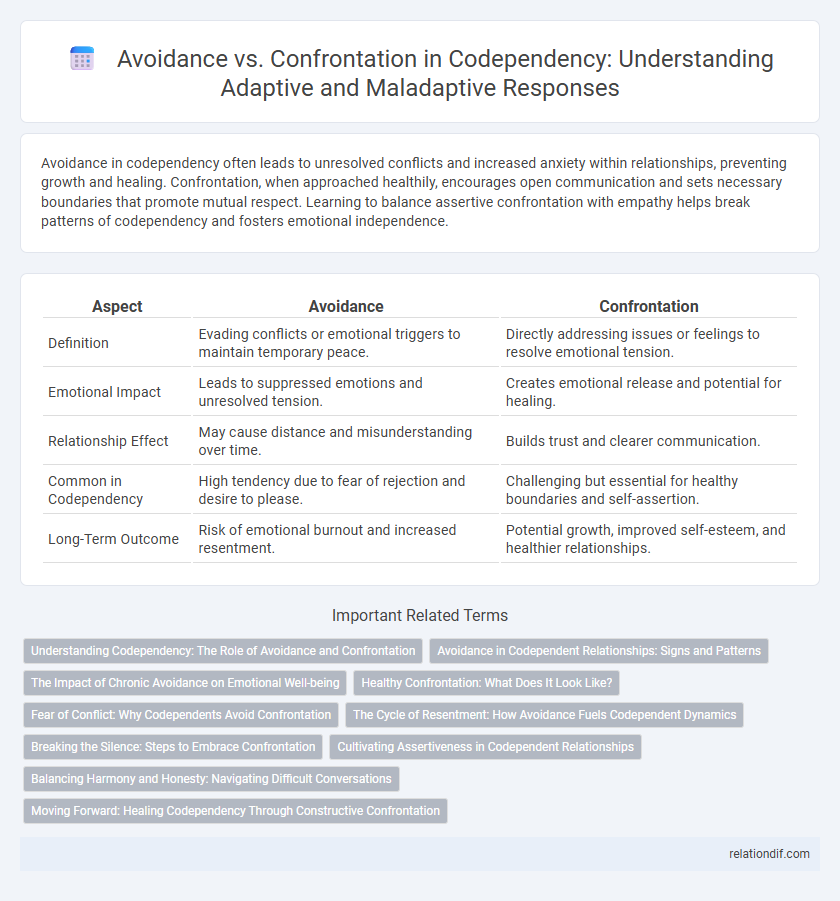Avoidance in codependency often leads to unresolved conflicts and increased anxiety within relationships, preventing growth and healing. Confrontation, when approached healthily, encourages open communication and sets necessary boundaries that promote mutual respect. Learning to balance assertive confrontation with empathy helps break patterns of codependency and fosters emotional independence.
Table of Comparison
| Aspect | Avoidance | Confrontation |
|---|---|---|
| Definition | Evading conflicts or emotional triggers to maintain temporary peace. | Directly addressing issues or feelings to resolve emotional tension. |
| Emotional Impact | Leads to suppressed emotions and unresolved tension. | Creates emotional release and potential for healing. |
| Relationship Effect | May cause distance and misunderstanding over time. | Builds trust and clearer communication. |
| Common in Codependency | High tendency due to fear of rejection and desire to please. | Challenging but essential for healthy boundaries and self-assertion. |
| Long-Term Outcome | Risk of emotional burnout and increased resentment. | Potential growth, improved self-esteem, and healthier relationships. |
Understanding Codependency: The Role of Avoidance and Confrontation
Avoidance in codependency often manifests as evading conflicts to maintain perceived harmony, which reinforces unhealthy relational patterns and suppresses authentic self-expression. Confrontation, when approached healthily, serves as a critical tool for boundaries and self-assertion, challenging the underlying fear of abandonment central to codependent dynamics. Recognizing the balance between avoidance and confrontation is essential for breaking free from codependency and fostering emotional autonomy and mutual respect in relationships.
Avoidance in Codependent Relationships: Signs and Patterns
Avoidance in codependent relationships manifests through persistent reluctance to address conflicts or express personal needs, resulting in suppressed emotions and unmet boundaries. Common signs include evading difficult conversations, minimizing problems to maintain peace, and sacrificing self-care to prioritize others' desires. This pattern perpetuates emotional enmeshment and prevents healthy communication, often deepening dependency and unresolved tension.
The Impact of Chronic Avoidance on Emotional Well-being
Chronic avoidance in codependency exacerbates emotional distress by fostering unresolved conflicts and suppressed feelings, which often lead to increased anxiety and depression. This pattern undermines self-esteem and perpetuates a dependence on others for validation, hindering personal growth and authentic emotional expression. Over time, the avoidance of confrontation creates a cycle of emotional stagnation, reducing resilience and impairing healthy relationship dynamics.
Healthy Confrontation: What Does It Look Like?
Healthy confrontation in codependency involves expressing feelings and needs honestly while respecting boundaries and maintaining empathy for both parties. It prioritizes clear communication, active listening, and problem-solving rather than blame or criticism. This approach fosters personal growth and repair of relationships without escalating conflict or passive avoidance.
Fear of Conflict: Why Codependents Avoid Confrontation
Codependents often avoid confrontation due to a deep-seated fear of conflict disrupting their relationships, leading to emotional distress and perceived rejection. This fear stems from low self-esteem and an excessive need for approval, making direct communication feel threatening. Consequently, avoidance becomes a coping mechanism to maintain peace, though it ultimately perpetuates unhealthy dynamics and unresolved issues.
The Cycle of Resentment: How Avoidance Fuels Codependent Dynamics
Avoidance in codependent relationships prolongs the cycle of resentment by suppressing unresolved issues, leading to increased emotional distance and unspoken frustrations. This unchecked buildup of negative feelings often triggers confrontations that are more intense and less constructive, reinforcing codependent patterns. Breaking this cycle requires conscious efforts to address conflicts openly and establish healthy communication boundaries.
Breaking the Silence: Steps to Embrace Confrontation
Breaking the silence in codependency requires embracing confrontation as a vital step toward healing and self-empowerment. By recognizing avoidance patterns and gradually expressing honest feelings, individuals can foster healthier boundaries and authentic communication in relationships. Practicing assertiveness techniques and seeking therapeutic support accelerates the transition from silence to constructive dialogue, reducing emotional burden and dependency.
Cultivating Assertiveness in Codependent Relationships
Cultivating assertiveness in codependent relationships involves recognizing personal boundaries and expressing needs clearly without fear of rejection. Avoidance often perpetuates unhealthy dynamics by suppressing authentic emotions, while confrontation encourages honest communication and mutual respect. Developing assertiveness empowers individuals to break free from codependent patterns and foster balanced, supportive connections.
Balancing Harmony and Honesty: Navigating Difficult Conversations
Balancing harmony and honesty in codependency involves recognizing when avoidance protects fragile emotions and when confrontation fosters growth and trust. Navigating difficult conversations requires clear boundaries and empathetic communication to prevent resentment while maintaining connection. Effective strategies include active listening and assertive expression, promoting healing without sacrificing relational stability.
Moving Forward: Healing Codependency Through Constructive Confrontation
Healing codependency requires shifting from avoidance to constructive confrontation by addressing underlying fears and establishing healthy boundaries. Embracing open communication techniques fosters self-awareness and empowers individuals to express needs without guilt or manipulation. This transformative approach promotes emotional resilience, healthier relationships, and sustained personal growth.
Avoidance vs Confrontation Infographic

 relationdif.com
relationdif.com